Seasonal releases - 2024
Check out the newest features and enhancements for 2024
Summer release 2024
Facets management tool in Playboard
Facets are the groups in which your catalog products are classified to help shoppers discover them when browsing or searching your commerce store. Products can be categorized according to a specific characteristic, attribute, or attribute value, such as brand, pricing range, size, etc.
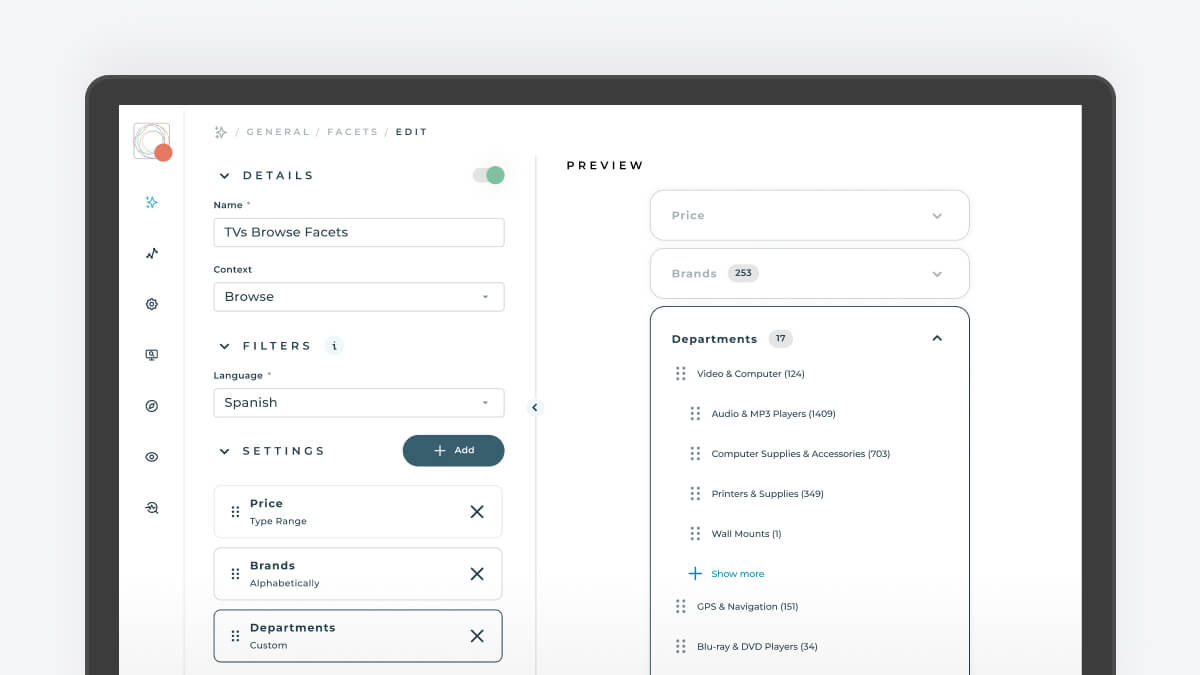
Traditionally, your Empathy Platform representative configured facets for your commerce store upon request. Changes required a long time to be reflected, negatively impacting your commerce store's performance. After hearing your call, as a merchandiser, you can configure and modify how facets are displayed in your commerce store with only a few clicks via the Empathy Platform Playboard's new Facets management tool.
With the Facets management tool, you can now configure the categories and sub-categories by which products can be dynamically filtered to narrow down the search results or discover how the product catalog is organized more intuitively. Configurations can be created related to one or more queries for search experiences or a specific product attribute and value for browse experiences. In both cases, shoppers obtain more accurate and relevant results for what they’re looking for. What are you waiting for to try the new Facets management feature?
Services impacted: Playboard | Config service | Index service | Search service
Query Analysis in Explain
Intending to continuously evolve to offer a holistic experience for merchandisers to benefit from a good and smooth management of their commerce stores, the Explain tool has moved forward to the next level. Transparency and explainability are the mainstays of the Explain transformation, which is now split into two tabs. The Search tab keeps the initial functionality of Explain, giving answers to how and why products are ranked and scored in the results list. At the same time, Query Analysis joins the family to shed light on the analytics related to query performance based on several insightful KPIs.
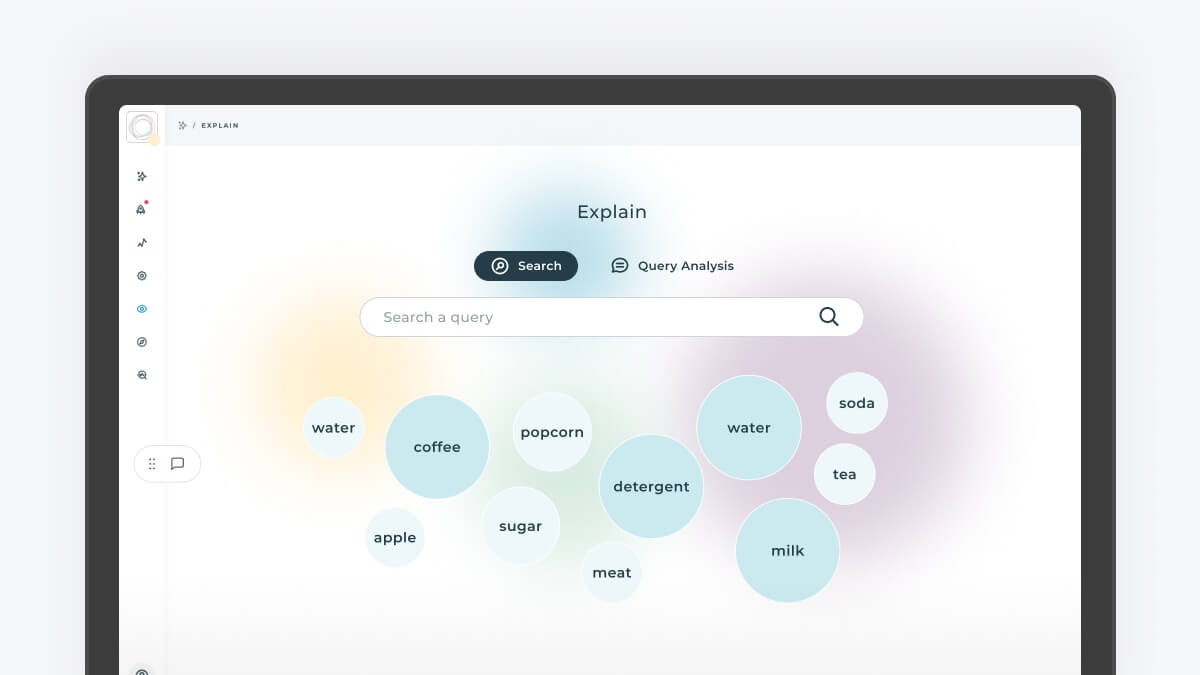
With the new Query Analysis tab, you can analyze query performance for the last seven days through relevant KPIs, such as total number of queries, number of queries per session, CTR, and conversion, among others that relate to shoppers' interactions with queries and products listed on the results page.
Query Analysis encompasses Search metrics and Search data. Search Metrics presents insightful query metrics displayed through three different charts to make data more accessible, understandable, and joyful: Evolution Over Time, Funnel, and Query Distribution. On the other hand, Search data presents a table that includes the top 10 products related to a query in decreasing order, along with three meaningful KPIs: clicks, add-to-cart, and checkout.
But this doesn’t end here! Stay posted to know more about the next shift of the Explain feature because something else is being cooked.
Services impacted: Playboard | Statistics service
Discovery tab deprecation in Playboard
The Empathy Platform Playboard is a live panel that evolves with your business needs. Up until now, the Playboard’s left-side menu panel was divided into two different tabs. Now, these Discovery and Search tabs have been unified in a joint panel to simplify and make the tools and features you can use to manage the Search and Discovery experiences in your commerce store more accessible.
The two elements that belonged to the Discovery tab have been renamed and placed elsewhere. The Insights > Overall feature continues to be within the Insights section but has been renamed as Browse Metrics. Browse metrics helps scan shoppers' navigation with metrics such as views, click position, CTR, and add2cart, among others. The functionality hasn’t been modified, so it works exactly as it was.
The Play > Configuration tool is now accessible directly from the side panel under the new name Browse > Configuration. Use Browse > Configuration to modify facet configurations and boost and bury products and product attributes on the product listing page (PLP) to fine-tune the browsing experience. Again, the functionality hasn’t been modified, so it works exactly as it was.
My Highlights and Activity Stream were common features for search and discovery tabs, so they’ve been kept the same. Don’t waste more time, and visit the Playboard to check out these changes right now!
Services impacted: Playboard
Promotion tool redesign
The Empathy Platform Playboard’s Promotion management tool helps define promotion banners and promoted results to customize search results and make them stand out on the search engine results page (SERP).
Since the tool interface hasn’t evolved together with the user experience of other Playboard tools, the Promotion edition screen has been redesigned for consistency to align with the rest of the Playboard tools, although its ways of working function as they did. Whit this, you gain time: you now work quicker and easier when configuring a promotion, as you can find things where they’re supposed to be, like for the rest of the Playboard’s tools, such as Equalize or Query Ranking.
Now, the Promotion edition screen is divided into vertical sections where the different elements are placed. The details pane, filters, and promotion settings are on the left. The preview area occupies the rest of the screen. In addition, when clicking one promotion from the settings, the settings edition panel opens on the right side of the screen, where you can configure all the details related to the promotion.
Go to the Playboard now and try the new look and feel for the Promotion tool! Don’t forget to check the Promotion documentation in the EPDocs portal if you have any questions.
Services impacted: Playboard
Related Prompts POC
Since innovation never sleeps at the Empathy.co headquarters, a new revolutionary AI-based feature is being devised. Its name? Related Prompts. Its purpose? To introduce a new, vibrant, conversational dimension to the search experience that helps shoppers find the right products quickly and effortlessly and retailers drive better engagement.
Opposite to traditional search suggestions relying on historical and contextual data, related prompts are synthetically generated, enabling rapid deployment without the typical challenges of a cold start. These human-like search suggestions favor a more conversational and intuitive search and discovery experience since additional full natural language queries are generated instantaneously. This way, shoppers are offered alternative ways to phrase their search queries, reducing friction in their shopping journey and increasing product catalog and categorization discoverability.
Related Prompts uses Empathy Platform’s proprietary models, so these queries are tailored to each retailer's product catalog, offering an entirely customizable and flexible approach to search optimization. Furthermore, like other search suggestions, prompts can be curated to suit business needs by adding new prompts to align with active campaigns, promoting prompts to drive search behavior, and removing irrelevant or low-performing prompts through the Empathy Platform Playboard. In addition, the underlying models ensure data provenance, governance, and total control over data management while adhering to privacy regulations.
Unlock the future of search with Related Prompts. Check it out today to revolutionize your shoppers' journey and watch engagement soar!
Services impacted: Playboard | Semantics service | Search service | Beacon service
Content search experience in EPDocs revamped
Together with the GenAI content holon search improvements announced in the Spring’24 release notes, the content search experience of the Empathy Platform Docs portal continues to evolve.
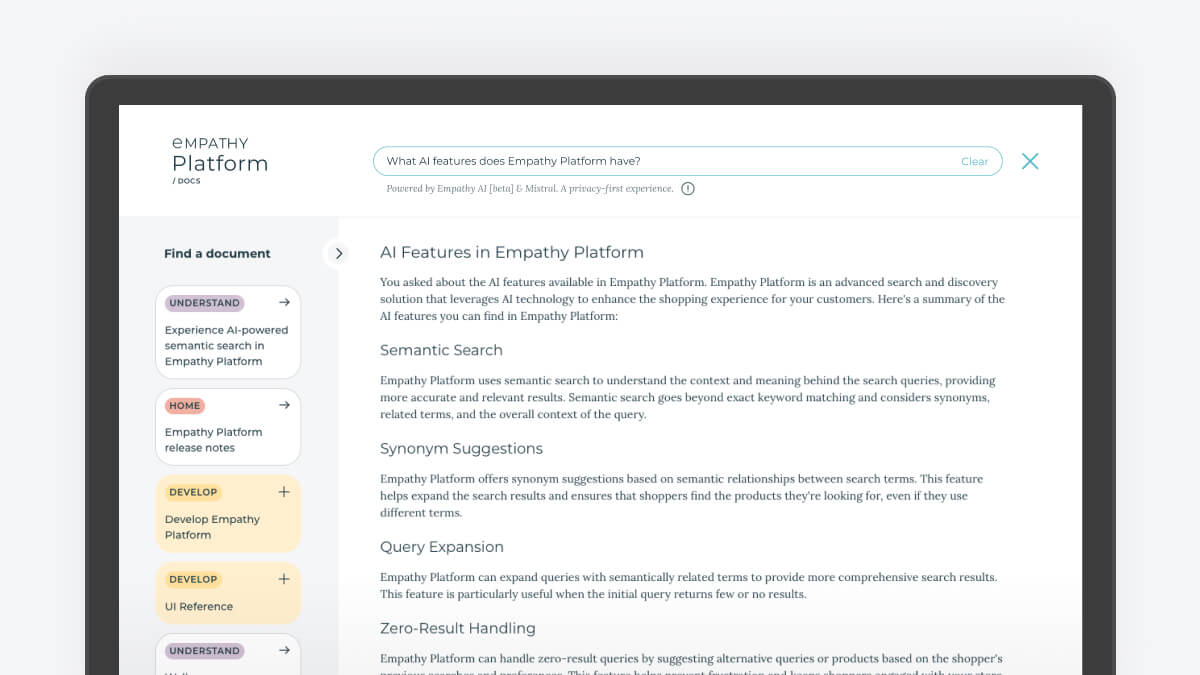
The adaptation of the generative content holon search experience for mobile devices led to a required redesign, moving from circular holons to more aesthetic and attractive squarish shapes that benefit content navigation and discovery. Such was the success of this change among readers that this same design has been implemented in the desktop version without escaping from some adaptations that the scope required.
Now, both content search experiences share the same stage for desktop devices. Once you launch a query, you can explore relevant EPDocs portal content thanks to the redesigned holon-based search on the left; a visually rich, explainable, and intuitive experience. This way, the generative search on the right, seamlessly typed while maintaining your privacy and trust when interacting with it, is complemented by the revamped holon search.
But this isn’t everything! The response given by the generative system includes a list of clickable references that are actually the sources used to create the answer. You can check the source links to get a deeper understanding as you’re redirected to relevant final documents related to the topic asked.
Don’t lose track of the EPDocs portal. You cannot even imagine what we’re preparing for you next since this is the environment for discovering all the Empathy.co innovations in content search.
Services impacted: Empathy Platform Docs | Semantics service
Empathy.co doesn’t only provide AI hybrid search & discovery experiences that you can operate, extend, and own according to your business goals, while ensuring privacy-first, consent-based, and ethical practices. Through the Open Innovation initiatives (opens new window), we also foster the development of AI-based, cutting-edge, built-in-public technologies that are driven by the market evolution needs.
Many of the features, tools, and functionalities finally implemented within Empathy Platform find their foundations in the Open Innovation projects. Curious about the initiatives we’re working on right now in Open Innovation and Open Innovation AI? Keep an eye on the Empathy Holding's roadmap (opens new window) and don’t miss anything!
Spring release 2024
Semantics in Explain
Explain is the Empathy Platform Playboard tool that helps merchandisers better understand how product scoring determines the order of products on the search engine results page (SERP). To do so, the results your shoppers would see when looking for a product in your commerce store are displayed in Explain after entering an initial query. However, this query does not always return results.
Semantics recommendations are a fallback method you can implement in your commerce store to avoid shoppers’ frustration when the traditional keyword-based search returns zero or low results. The Semantics recommendations, usually displayed as product carousels, are relevant product suggestions based on semantic affinities for the initial query. These alternative results, meaning- and context-related to the original query, inspire your shoppers and guide them through enriched search and discovery experiences.
Should the Semantics microservice be active for your instance, Explain will now display the Semantics recommendations your shoppers would get when their query does not return results in your commerce store.
When clicking one of the queries suggested on top of each carousel, Explain replaces the query with no results with the one selected, and the results update displays the details about their product scoring. Isn’t it amazing?
Visit Explain right now and check each product, its position on the SERP, its score, and the scoring criteria involved!
Services impacted: Playboard | Semantics service
Semantics dataviz in Insights
The Semantics microservice is the Empathy Platform mechanism especially leveraged as a fallback to reduce shoppers’ frustration when they find queries with zero or low results, thus preventing them from leaving your store. Semantics retrieves relevant product results’ suggestions related to the original query in context and meaning. Semantics presents shoppers with an enhanced experience, helping them find what they’re looking for, usually displaying as alternative queries’ suggestions with product carousels for queries with no or low results in your commerce store.
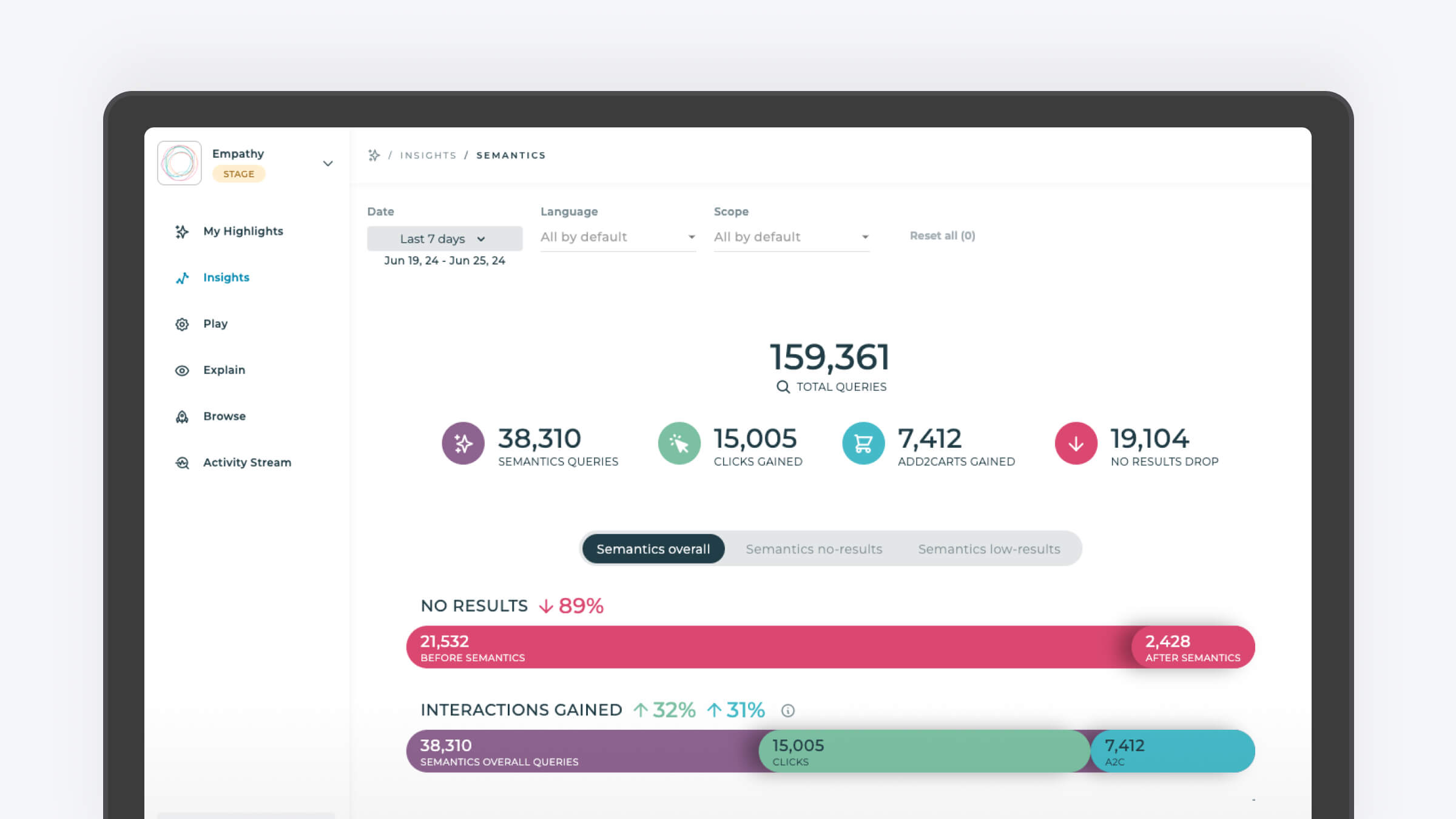
Now that the Empathy Platform Playboard's Insights section includes the new Semantics dataviz, you can visualize the query performance after the Semantics microservice is used to improve zero-result or low-result queries.
First, you can find a general view of aggregated data for both no- and low-results, comparing the total number of queries with the number of queries that Semantics has enhanced, the clicks and add-to-carts gained, and the drop in no-results queries. Next, the data visualization in the different graphs and the table can be general or detailed per query type: no-results or low-results, depending on the selection made in the scope tabs.
With the analysis made in the Semantics dataviz, you can confirm how using Semantics improves your shoppers’ product discovery experience and increases the overall performance of your business, thanks to the number of clicks, add-to-carts, and checkouts gained.
Don’t waste any time and dive into the query performance with Semantics dataviz right now!
Services impacted: Playboard | Semantics service | Statistics service
IMC Semantics microservice setup
You already know that the Empathy Platform Semantics microservice identifies the meaning and context of search-related data to calculate semantic similarities between queries and products, thus leading the way to hybrid search.
But this is not the only use case for Semantics! Empathy Platform utilizes semantic capabilities to enrich your product catalog at index time with real, valuable search information based on relevant related terms, keywords, and other semantic search information. Also, Semantics is used to create product recommendations for zero- and low-result queries and offer meaningful synonym suggestions when defining query synonyms.
Until now, you could control only semantics for synonym suggestions. Now, Empathy Platform allows you to manage semantic catalog enrichment and semantics product suggestions through the Playboard.
Thanks to the new Semantics configuration section in the Instance Management Control, you can set up the corresponding configuration settings to meet your commerce store needs by leveraging the highest potential of the Semantics microservice's capabilities. Contact your key account manager as soon as possible to coordinate the best options for your search and discovery experience!
Services impacted: Playboard | Semantics service
Empathy Platform Self-managed Components
The Self-managed Components (SmC) are a set of Empathy Platform's essential capabilities, functionalities, and tools that you, as a developer, can use to try, adapt, and personalize these disruptive search and discovery experiences on any machine.
The main elements of the SmC package are the four basic foundations for privacy-compliant, lightweight search and discovery experiences: an image of Elasticsearch, the indexing job in charge of loading a sample open-source movie catalog, an interface frontend layer based on the Interface X archetype, and an image of the Empathy Platform Search microservice. Once the package has been downloaded and deployed, accessing its content is as simple as typing a few URLs in your browser.
The SmC package includes some of the most outstanding elements of Empathy Platform. The highlighted capabilities include Contextualize, Empathize, and Top Clicked, which set the foundation for generating several renowned search and discovery features, such as Query Suggestions, Popular Searches, or Top Product Recommendations. Among the functionalities provided, you can find Sorting and Facets and Filters. As for tools, the package comprises Related Tags and Next Queries management tools and links for Promoted Results, Banners, and Redirections.
With this release, you can customize the SmC package to recreate similar scenarios related to your business requirements and try Empathy Platform’s search engine performance. You can modify the search configuration and the catalog to unveil the unlimited personalization possibilities that the Empathy Platform search and discovery experiences offer. Eager to get started with the Self-managed Components package? Download and deploy it to start enjoying it!
Services impacted: Beacon service | Search service
Generative content holon search
Empathy.co continuously strives to push the boundaries of innovation, particularly in enhancing search experiences. The most recent project involved fine-tuning a Mistral AI open model combined with domain-specific expert systems to uplift content search experiences based on the Empathy Platform domain.
This new privacy-first, aesthetic, generative content holon search experience complements the existing contextual holon-based search experience of the Empathy Platform Docs portal. When entering a query in the search box, the generative search system starts typing a response that gives a few basic touches on the topic, including related specific links to relevant final documentation pages to dive deeper into the matter asked, if needed. In addition to this, the holon-based search is available to complete this visually rich, explainable content search experience.
It sounds great, but how was it done? By creating a seamless generative AI content search experience that maintains people’s trust and privacy while interacting with it. Empathy’s Privacy-by-Design development process ensures a holistic and responsible development of AI technologies to create an intuitive conversational search experience based on GenAI.
Thanks to a flexible and secure infrastructure and a user-friendly interface, you can now enjoy this intuitive and familiar search experience based on a Mistral AI model fine-tuned with Empathy Platform's official documentation.
Go and try the EPDocs portal’s disruptive GenAI search experience right now! Still wondering how this project was built? Check out this LinkedIn live session unveiling this project’s journey.
Services impacted: Empathy Platform Docs | Semantics service
Empathy.co doesn’t only provide AI hybrid search & discovery experiences that you can operate, extend, and own according to your business goals, while ensuring privacy-first, consent-based, and ethical practices. Through the Open Innovation initiatives (opens new window), we also foster the development of AI-based, cutting-edge, built-in-public technologies that are driven by the market evolution needs.
Many of the features, tools, and functionalities finally implemented within Empathy Platform find their foundations in the Open Innovation projects. Curious about the initiatives we’re working on right now in Open Innovation and Open Innovation AI? Keep an eye on the Empathy Holdings' roadmap (opens new window) and don’t miss anything!
Winter release 2024
Semantic enrichment training process
A fulfilled and polished product catalog is fundamental for a search engine to provide relevant results after a shopper has entered a query or selected a specific product category in your commerce store. It’s well known that shaping a proper catalog isn’t a simple task, but not impossible. Empathy.co’s AI-powered search experience comes to your rescue to help you generate a complete and functional product catalog to offer your shoppers joyful search and discovery experiences and to avoid frustration when a query has no results.
As announced with the Autumn’23 release notes, your product catalog is enriched with semantically similar terms, also called semantic signals. The terms are provided by semantic models trained with domain-specific datasets. The semantic models previously had FAISS as a vector base, with long deployment times, which isn’t very efficient. From now on, Qdrant is the vector base used to automate and shorten deployment times by 65%.
Intending to improve the entire data generation process, the next enhancement consists of migrating from a notebook to a workflow that can be executed in argo-workflows.
Lastly, to measure the impact of the enhancements and implementations made regarding product catalog semantic enrichment, a new report has been created to evaluate the decrease in no-results and the increase in clicks and add–to–cart.
Concluding with some insights about the first results obtained after the use in production environments of the Semantics API, no results were reduced by 65%, and Click to Rate (CTR) achieved a 27% increase thanks to the use of AI-powered mechanisms. What are you waiting for to embrace the future of an enhanced AI search experience?
Services impacted: Index service | Search service
IAM service tuneup
Pursuing a reinforcement in terms of security for the Empathy.co products, the current authentication and authorization mechanisms have been replaced by the latest standards in the market, and user permissions have been revamped to have fine-grained control of them.
We’ve been working to evolve the capabilities and features of the Identity and Access Management (IAM) service, as well as its level of integration in the Empathy ecosystem. IAM is used to centrally manage users' and applications’ permissions and access to Empathy.co offering, such as Empathy Platform APIs or Playboard, among others. With IAM, who is authenticated (signed in) and authorized (has permissions) to use resources can be controlled.
The IAM service tuneup process is still in its first stages, but some work has been done so far. The backend services have already been integrated with the IAM service, so they are prepared to support the new IAM flows. The same happens with the frontend applications, which are almost prepared to obtain authorization from IAM.
Some of the benefits of using the different IAM APIs can be summed up by saying that they empower other teams to create their protected resources set up, allow control over which exact permissions each role has, and facilitate the creation of users, guests, and clients that use protected resources (currently WIP). Stay tuned to the next releases to know how the IAM integration is nailing it!
Services impacted: Audit service | Beacon service | Config service | Index service | Search service | Statistics service
Offline evaluations & GenAI
Since we don’t conceive our lives nowadays without a computer or a mobile phone in our hand, Artificial Intelligence (AI) has arrived to stay, in one way or another. As it could not be otherwise, the days of classic keyword-based searches seem to be gone since the way shoppers search for products online has evolved dramatically. The path is now clear for an innovative hybrid search based on AI, particularly on Generative AI, providing more conversational and understanding interactions between your shoppers and your commerce store.
Empathy Platform leverages a generative AI technology that combines explicit manual human and automated AI-generated feedback, which is called judgments. So, under the framework of offline evaluations, you can accurately determine product relevance for specific queries. Offline evaluations are complementary to online evaluations, which are judgments obtained from the implicit anonymized collective behavior of your commerce store shoppers retrieved from a contextualized query.
Based on explicit and implicit feedback, an ideal AI-powered product ranking results list that merchandisers could compare with their current traditional search results is generated. This comparative evaluation is aimed to help you adjust and manage your Empathy Platform Playboard configurations until you achieve results similar to those given by the search enhanced with judgments. Also, it aims to evaluate the GenAI model itself, verifying whether model training is being improved and shaping it.
Don’t let AI overtake you, check the What You See Is What You Trust video to get more insights about offline evaluations and be prepared for what’s next!
Services impacted: Playboard | Index service | Search service
Playboard feedback
Empathy Platform Playboard is a dashboard devoted to merchandisers offering insights, analytics, and tools that are in continuous evolution. With merchandisers at the center, tools are ideated, developed, and iterated to provide you with no-code, AI-powered features that elevate the search and discovery experiences for your shoppers and help you achieve your business goals.
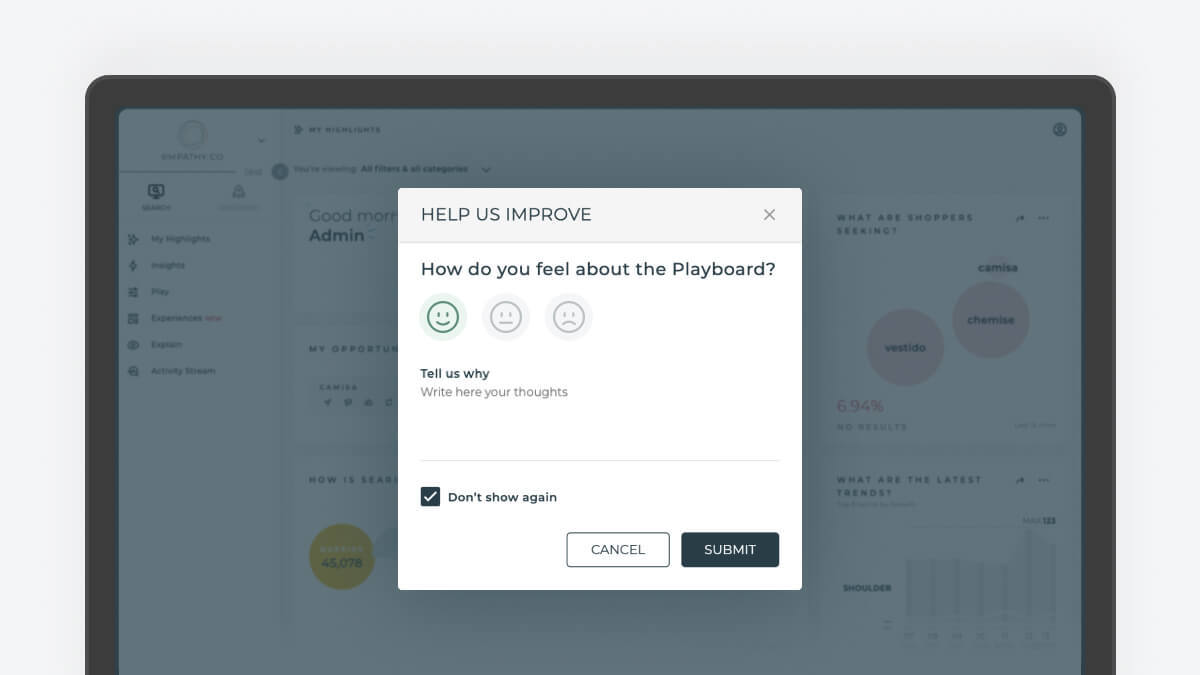
Since you use the Empathy Platform Playboard daily, the feedback you can provide is so meaningful to keep evolving existing functionalities and start creating new ones. When you enter your instance, a pop-up displays and asks you to help us improve. You can indicate your level of satisfaction with the Playboard through three animated faces.
However, an emoji is not enough to express everything you want to tell us about the Playboard most of the time. For this reason, you have a text box to optionally include your comments about how the Playboard can be improved.
If you don’t have the time to write your suggestions down, close the pop-up and you’ll be asked again as soon as you enter the instance the next time. Not keen on giving us feedback? Don’t worry, select the corresponding checkbox and you won’t be asked again. But remember that working hand in hand with you is what makes our products better!
Services impacted: Playboard
Explain renewal
Explainability means everything to merchandisers when trying to understand why products are ranked the way they are, how the attribute values weighting works, and how the most popular products influence the product positioning, among other factors taking place in product results ranking.
The Explain feature in the Empathy Platform Playboard furnishes you with proper answers to better understand interactively and visually why your product results are positioned the way they are and how your commerce store performance can be enhanced. To improve the merchandiser’s experience, Explain has been renewed to show data as self-explanatory and more user-friendly.
Currently, the bar chart with the top 24 products ranked is not displayed anymore, giving more space to product cards in the result list. For the same reason, the legend of the scoring criteria has been removed, showing only their representative icons. Each product card now shows a bar with the scoring criteria indicated in percentages that are used to determine the product’s overall score and its distinctive colors and icons.
The product score panel has been redesigned as well. As part of the main changes made, the spider chart has been removed from the right to give more space for comparing product scores. Now, the query entered to explore the data is always displayed on the top left corner of the panel, together with the Optimize tools suggested for merchandisers to enhance the performance of the results related to the entered query.
Last but not least, the top products for the query entered can be downloaded in batches of 100, 500, 1 000, or 1 250 products; and their confidential data, meaning the scores given by the different criteria to each of them, can be included or not in the downloadable file according to your choice. Don’t waste any second and check all these improvements made in Explain!
Services impacted: Playboard
Pinned products in Query Ranking
As a merchandiser, you can fine-tune how products are ranked on the results list according to your business strategies by using the Query Ranking tool within the Empathy Platform Playboard. At Empathy Platform, to help you design an attractive and captivating search engine results page (SERP) in an enjoyable and effortless way, the new Pinned Products feature has been added to the Query Ranking management tool of the Playboard.
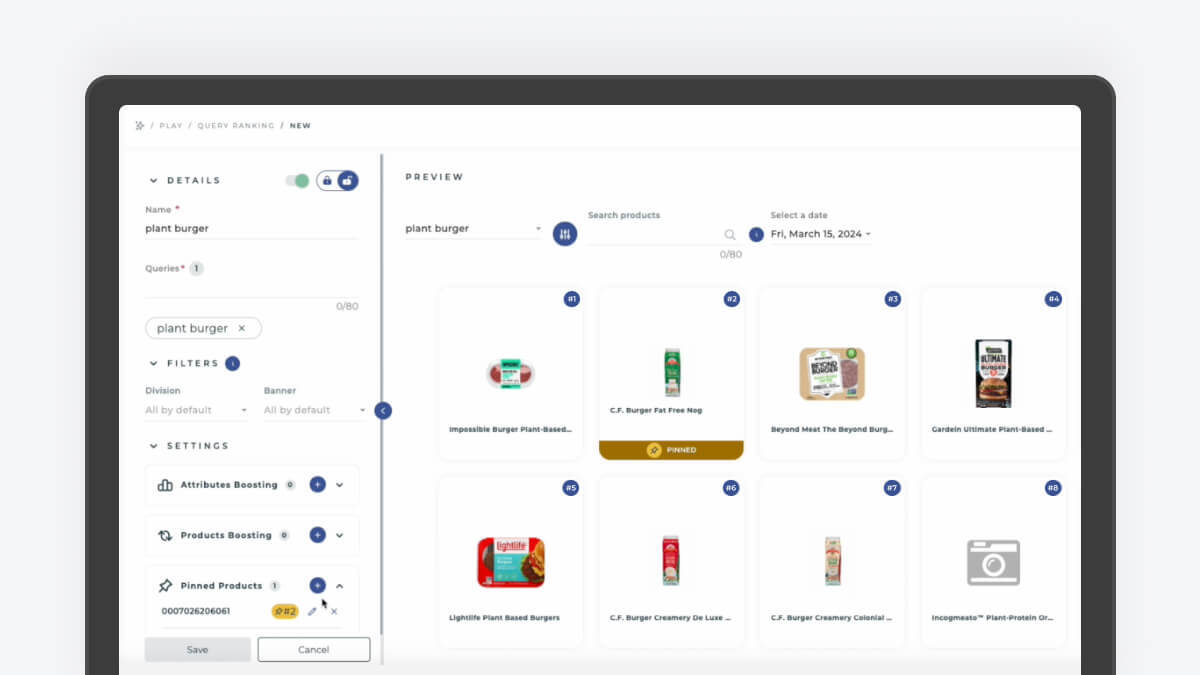
Until now, you can boost or bury specific products to place them respectively on the top or bottom of the SERP and configure certain product attribute values to soft boost or bury product groups and modify their ranking. With Pinned Products, you can pin a product in a specific position within the first page of your SERP. This way, the organically assigned position for this product is modified and replaced by the configured one. For example, a product organically placed in position 35 will appear in position 7 if you pin it to be there.
Of course, you cannot boost or bury products when you pin them in a certain position or place two products in the same position. However, you can schedule your pinned products and obtain a high level of granularity in your configurations, orchestrating your product catalog positioning in the best way possible to fulfill your business expectations. Play with the new feature and enjoy creating vibrant and joyful search and discovery experiences!
Services impacted: Playboard | Index service | Search service
Indexing parallelization
Carrying on with the efforts made to redesign the Index microservice architecture, together with the index horizontal scalability improvements announced with the Autumn’22 release notes, an indexing parallelization was implemented.
The index horizontal scalability, in short, helped to replace the sequential indexing of product catalog feeds with simultaneous indexing. This was achieved thanks to the Index Coordinator component, which is in charge of managing and distributing several indexing pipelines at the same time.
Before the indexing parallelization enhancement, feeds were processed based on beforehand configured priorities or arrival order, with the capability to parallelize based on Client ID. From now on, both the Index Builder and the Index Deployer processes that the Index microservice encompasses work in parallel with several feed files. The Index Builder manages two levels of parallelization, prioritizing and processing in parallel clients whose feeds are not being processed and feeds of a different type. For example, if the product catalog feed of customer A is already being processed, then customer B’s product catalog feed can start being processed. However, if a different type of feed for customer A is received, such as a categories feed, the Index Builder can process the two in parallel as it isn’t a product catalog feed.
Sometimes, the Index microservice can receive a unique feed from a merchandiser, but this feed is split by the Index Builder into different ones, which are normally differentiated by language. As the Index Deployer also works in parallel with several feeds, different language feeds from a client are now indexed at the same time. Needless to say, with this parallelization, different feeds from several clients can be indexed simultaneously.
Remember that you can monitor and manage the feed indexing via the Index section of the Instance Management console of your Playboard instance, so go there and check how they’re being sped up!
Services impacted: Index service
Query Results Preview with filters
In the ongoing commitment to anticipating shoppers' intentions and aligning with your brand strategy, the Interface X Components library (opens new window) now seamlessly integrates filter support within the Query Results Preview module. This empowers merchandisers to enhance the Brand Recommendations feature, elevating virtual storefronts across your commerce store.
Your brand's favorite trends and strategic queries can now be further optimized to meet your business needs while providing shoppers with an even more tailored and intuitive discovery experience. Not only can you define strategic queries to drive shoppers to your brand's favorite trends, but you can also apply filters to refine and personalize the product discovery journey. Whether shoppers are exploring before typing a query or encountering a search dead end, they now have access to curated results that align perfectly with their preferences and your business goals.
From version 4.1.0-alpha.13 of Interface X Components, upgraded Query Results Preview’s components support sending information on queries, filters, and extra parameters to revolutionize your commerce storefront with even more accurate products. Leverage now the flexibility of the Interface X Components library to offer your shoppers an enhanced search and discovery experience while maximizing the impact of your brand strategy.
Services impacted: Interface X for Web
Advanced network security
Privacy is today the core pivotal aspect of the products that Empathy.co develops and offers. For this reason, ensuring a secure flow of information at all levels is crucial. As a consequence, advanced network policies that are designed to provide more granular control over traffic flow within Empathy’s network have been deployed.
These policies ensure that only legitimate and authorized traffic can access critical infrastructure components, thereby reducing the risk of unauthorized access and data breaches. This means that access to each component involved in the search and discovery experiences is restricted due to network policies.
Thanks to the integration of GitOps practices, all modifications to new services undergo rigorous code-level reviews. This ensures that any changes comply with our stringent security and operational standards before being deployed, enhancing the security and reliability of our network policies.
Continuing with a huge security measures enhancement effort, compliance with the Payment Card Industry Data Security Standard (PCI DSS) has been increased by 20%.
These changes may be subtle, but they’re fundamental to creating and iterating secure, high-quality, compliant services and products. Don't take your eye off them!
Services impacted: Audit service | Beacon service | Config service | Ether service | Index service | Play service | Search service | Statistics service | Tagging services
Empathy.co doesn’t only provide AI hybrid search & discovery experiences that you can operate, extend, and own according to your business goals, while ensuring privacy-first, consent-based, and ethical practices. Through the Open Innovation initiatives (opens new window), we also foster the development of AI-based, cutting-edge, built-in-public technologies that are driven by the market evolution needs.
Many of the features, tools, and functionalities finally implemented within Empathy Platform find their foundations in the Open Innovation projects. Curious about the initiatives we’re working on right now in Open Innovation and Open Innovation AI? Keep an eye on the Empathy Holdings' roadmap (opens new window) and don’t miss anything!